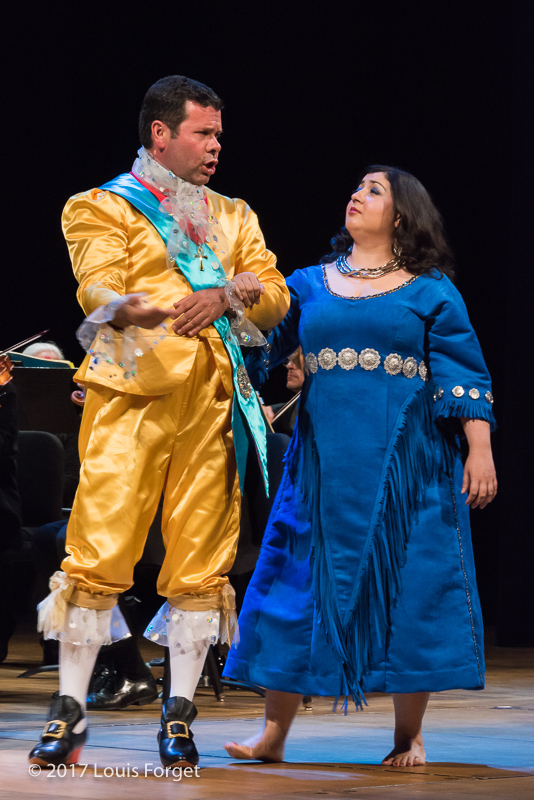Soprano Sherezade Panthaki radiant in Opera Lafayette’s Rameau

Robert Getchell and Sherezade Panthaki in Opera Lafayette’s presentation of Rameau’s “Les Indes Galantes.” Photo: Louis Forget
Jean-Philippe Rameau’s opera-ballet Les Indes Galantes is a long, sprawling work, clocking in at over three hours of music. An abridged version makes sense, but Opera Lafayette’s performance of a few fragments and the complete fourth entrée (“Les Sauvages”) on Wednesday evening added up to only an hour. This was the company’s last performance at Lisner Auditorium–not suited to its intimate style—before it returns to the Kennedy Center Terrace Theater.
The saving grace of this concert was soprano Sherezade Panthaki, who brought a silky legato tone and impeccable intonation to the role of the Indian princess, Zima. In her final showpiece, “Regnez, Plaisirs et Jeux,” she had more than enough sound to fill the hall with a laser-like precision. The embellishments added to the final section were brilliant, including a polished high note at the end.
Three men vie for Zima’s hand in the entrée’s forgettable plotline. As Adario, the faithful Native American who wins Zima, baritone Victor Sicard displayed a beautiful, puissant sound in his company debut. Occasional waywardness in terms of the beat was at least partially due to the unfortunate decision to place the orchestra on the stage, so that conductor Ryan Brown was behind the singers.
In the supporting roles, André Courville’s prominent bass-baritone made him a fine, arrogant Dom Alvar, the Spaniard who also courts Zima. Tenor Robert Getchell, an Opera Lafayette favorite, was a fawning Damon–the Frenchman who trades barbs with Dom Alvar as they compete for Zima– and especially fine in the part’s long melismatic passages. Eight singers from Gallery Voices, led by artistic director Rosa Lamoureaux, seemed far too light on the choral parts.
The decision to place the orchestra on the stage instead of in the pit space, as they were for their performance of Gaveaux’s Léonore in February, also did not do any favors for the Opera Lafayette Orchestra–small in number and playing historic instruments. The woodwinds and the chorus, placed behind the auditorium’s proscenium arch, were too often obscured sonically, especially a shame considering the excellent playing of the oboes and bassoons.
Instrumental highlights included the pastel-faint sound of the flageolet, the small pipe that is the predecessor of the piccolo, played gracefully by Charles Brink in the “Air pour Zéphir” from the entrée “Les Fleurs,” accompanied only by the violins as the bass line. Brink and Kathryn Roth were also excellent in the paired flute parts, for example, in the gorgeous “Adoration du Soleil” movement from “Les Incas de Pérou.”
Conductor Ryan Brown struggled to keep singers and musicians aligned with one another, leading to some confused moments. When Brown led by playing violin, the beat was even less clear to the orchestra. The conductor seemed to rush ahead of the other string players in some of the faster dances on the first half, a few excerpts from the prologue and second and third entrées. Dance pieces where he conducted instead, like the delicate “Musette” from the Prologue, generally fared better.
The minimalistic staging by Dietlinde Turban Maazel, widow of Lorin Maazel, was almost not worth the trouble, featuring some awkward movement and dancing by the chorus. The neon-bright costumes by Patricia Forelle provided a dash of much-needed visual color, and the tattoo sleeves worn by Sicard’s Adario got one of the evening’s rare chuckles.
Opera Lafayette’s 2017-18 season offers Monteverdi’s Il Combattimento di Tancredi e Clorinda with lutenist Thomas Dunford and harpsichordist Jean Rondeau; a double-bill of Domenico Scarlatti’s Erminia and Francesco Geminiani’s Enchanted Forest; and a selection of music from Versailles with tenor Aaron Sheehan and baritone Victor Sicard. operalafayette.org


